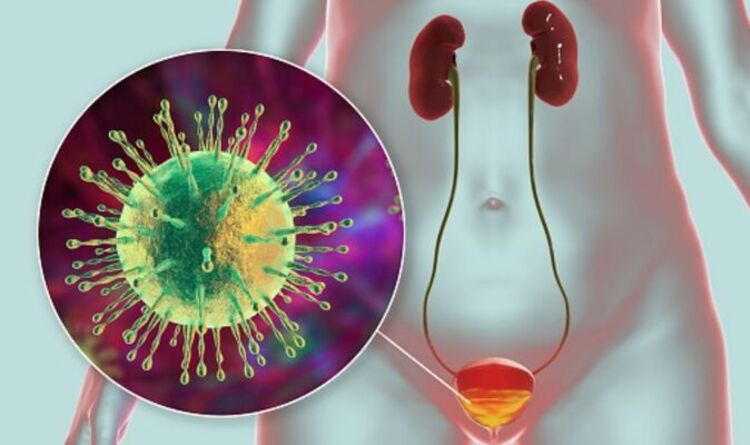Cystitis symptoms: How to avoid a urine infection
Doctor explains the symptoms and causes of cystitis
We use your sign-up to provide content in ways you’ve consented to and to improve our understanding of you. This may include adverts from us and 3rd parties based on our understanding. You can unsubscribe at any time. More info
Cystitis is an inflammation of the bladder that’s normally caused by a bladder infection. UTIs like cystitis commonly occur as a result of frequent sex, poor hygiene or using the wrong products. So, it’s not hard to understand why cystitis cases skyrocket around Valentine’s Day. Express.co.uk chatted to pharmacist Melanie King from Pharmacy2U to find out everything you need to know about cystitis.
Cystitis is normally nothing to worry about and most cases will get better by themselves within a few days.
However, around one in five women who have had cystitis will get it again.
Cystitis can occur at any age, but it’s more common in pregnant women, sexually active women, women with diabetes and women who have been through menopause.
The UTI is a total nuisance and can be really painful, and there’s also a chance that cystitis could lead to a kidney infection.


The key to beating cystitis is understanding how it occurs and how to treat it.
You’ll know you’ve got cystitis as soon as the symptoms come on because they’re very specific.
You might feel pain, burning or stinging when you wee, or need to wee more often and urgently than normal.
Your urine may be dark, cloudy or strong smelling and you might experience pain low down in your tummy or feel generally unwell, achy, sick or tired.

Most cases of cystitis are thought to occur when bacteria that live harmlessly in the bowel or on the skin get into the bladder through the tube that carries urine out of your body (urethra).
That’s why women typically get cystitis more often than men because their anus is closer to their urethra and their urethra is much shorter.
There’s no one specific way this happens, but certain things can increase your risk of this happening.
The NHS site lists the following as risk factors for cystitis:
- having sex
- wiping your bottom from back to front after going to the toilet
- having a thin tube inserted into the urethra to drain the bladder (urinary catheter)
- being younger than 1 or older than 75
- being pregnant
- using a diaphragm for contraception
- having diabetes
- having a weakened immune system
You might have heard the term “honeymoon cystitis” which is a coin of phrase used to describe cystitis caused by sex where the urethra and bladder are irritated by friction.
Sex moves the bacteria from the rectum up your urethra and into your bladder.
Some experts say that the urethra can also get bruised and irritated from sexual activity, especially if the woman hasn’t had sex in a while or if there is lots of friction.

How to prevent cystitis
If you get cystitis frequently, there are some things you can try that may stop it from coming back.
Melanie said you should see a GP if the following is true:
- If you don’t start to see an improvement in your symptoms within three days
- If you have recurrent cystitis, which is when you have experienced it more than three times in the last year or two times in the last six months
- If you have other symptoms such as blood in the urine, a fever (high temperature), or pain in your back or in your side
- If you are pregnant
- If you are a man, or if a child experiences the symptoms
If you’re too worried about going to see your GP, try a pharmacist.
Melanie explained: “If talking to someone about cystitis would make you feel shy or embarrassed, remember that it’s very common and doctors and pharmacists deal with it all the time.
“Pharmacies also have a private consultation area available, which should make you feel more comfortable.”
If your cystitis isn’t giving you too much trouble, your body will deal with the infection itself in a few days because it is a self-limiting condition.
Sometimes cystitis isn’t caused by an infection at all and won’t need to take antibiotics to treat it.
Taking an antibiotic when you don’t need it can increase the risk of bacteria becoming resistant, so your GP will only prescribe antibiotics if it’s absolutely necessary, Melanie said.
She added: “Dissolvable sachets are available to buy without a prescription which makes the urine less acidic that can help to reduce the discomfort.
“However, the best option is to drink plenty of water to help flush out the infection.
“You should hold off on any intimate activity if you’re experiencing symptoms. Otherwise, most mild cases usually get better by themselves without any further treatment.”
To prevent cystitis from coming back and to help existing cases to heal, there are a few things you should do.
Melanie advised: “Try having a shower rather than a bath to avoid exposing your genitals to cleaning products for too long. Use plain, unscented cleaning products where you can.
“Wear underwear made from cotton rather than synthetic material.
“Visit the loo as soon as the need to pee and after having sex. When you do go, make sure to wipe your bottom from front to back when you go to the toilet to prevent the spread of germs to the urine passage, and always stay hydrated!”
You might have also heard that cranberry juice can help, but don’t rely on it!
Melanie concluded: “The theory goes that cranberry juice increases the acidity of your urine making it difficult for bacteria to survive.
“Whilst it can affect the acidity of your urine slightly, there is little evidence that it is effective in helping with cystitis symptoms!”
Source: Read Full Article
